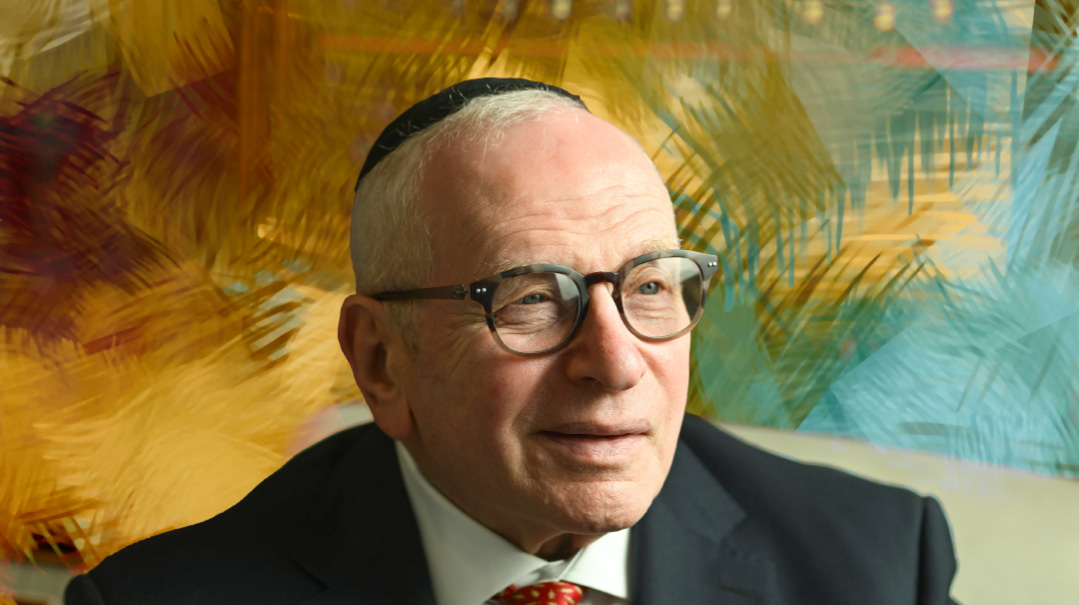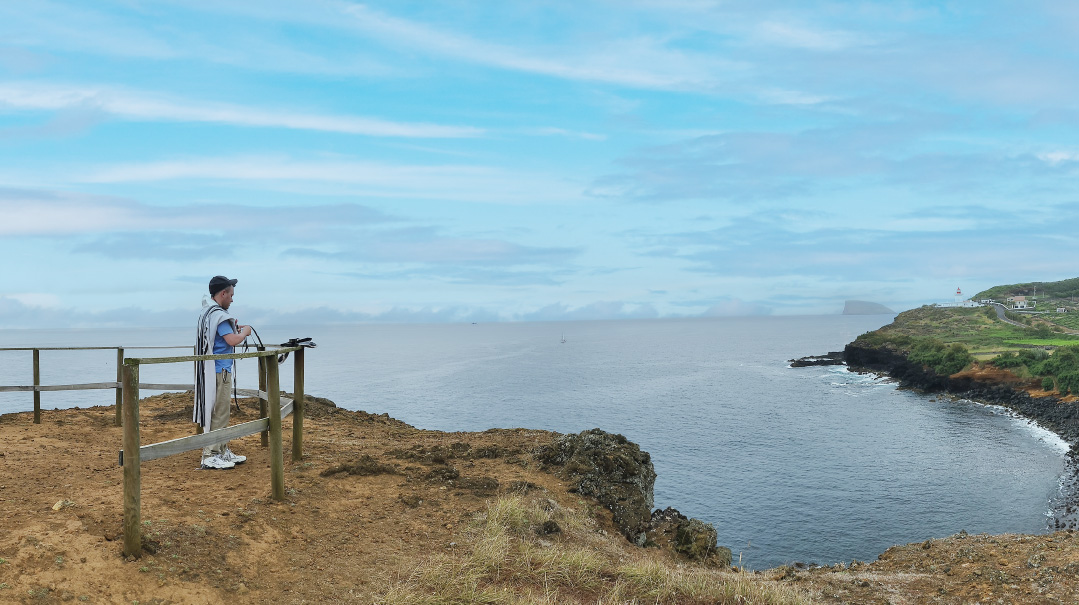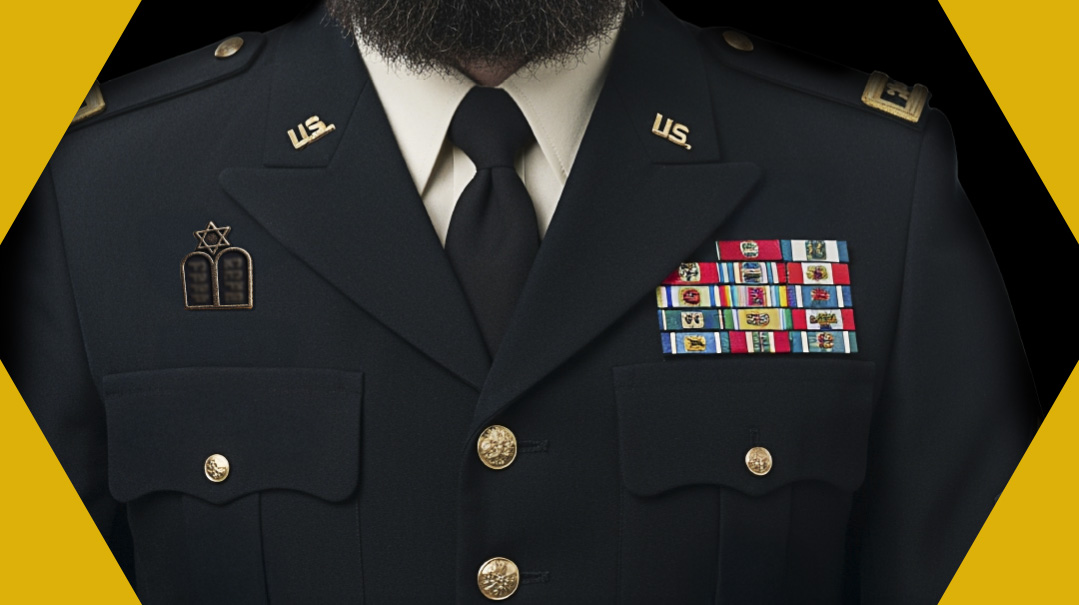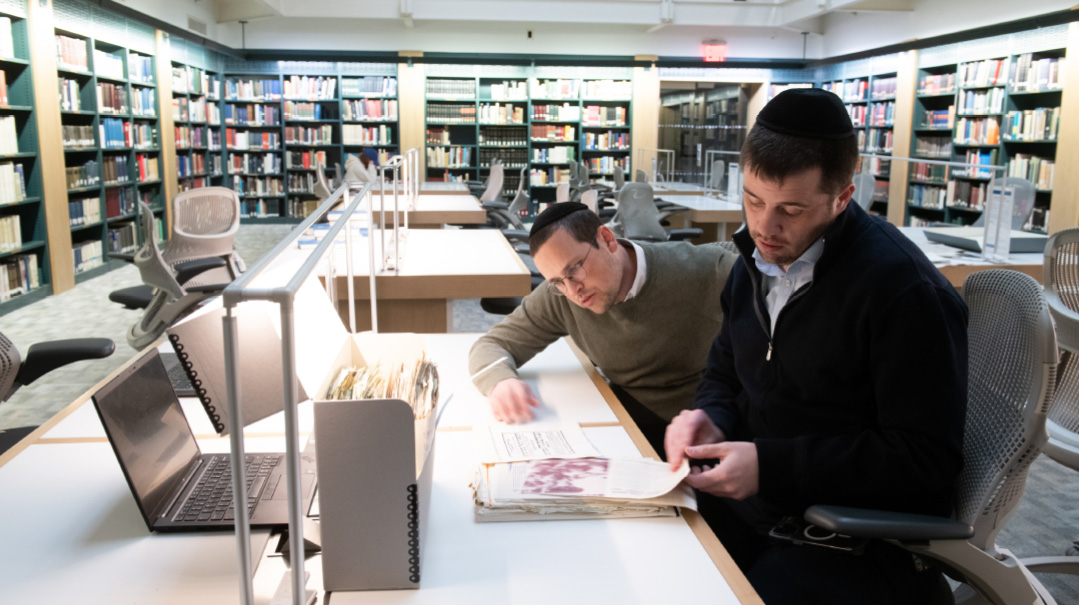Judgment Day
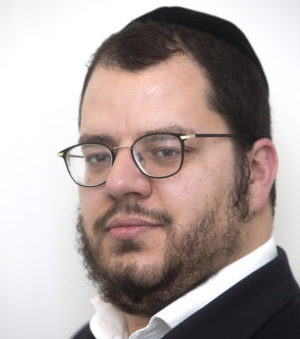
When successful entrepreneur Rav Sholom Landau was advised to leave the business world and become a dayan instead, he accepted the challenge

“People are willing to accept someone who’s been in Torah from the beginning but don’t always fargin someone who’s made a change midlife.” Businessmen-turned yungeleit learned alongside men who’ve never left yeshivah (Photos: Amir Levy)
It was a spring night in New York City.
Rav Sholom Landau real estate developer and owner of a successful computer company was young ambitious and deeply involved in the business community of chassidishe Brooklyn. Now there was a new business opportunity on the horizon and he wanted some advice.
Rav Shmuel Binyamin Kraus the Rav of the Satmar community in London England was in Williamsburg for a family simchah. Many people come to him for berachos and advice. Rav Sholom decided to join them.
“I received an offer to take part in purchasing a building on the outskirts of the neighborhood with the promise of incredible returns in a few short years” Rav Landau recalls. “It could have made me a good few millions.”
The meeting took place in the spring of 2006 just a few months after the petirah of the previous Satmar Rebbe Rav Moshe Teitelbaum ztz”l the Beirach Moshe. Rav Landau had been a devoted chassid of the Rebbe and always followed his advice but after his passing the chassidus split into two very large factions. Rav Landau would become a devoted follower of Rebbe Aharon Teitelbaum based in Kiryas Yoel. On this particular night he decided to discuss his business question with Rav Kraus. His concern wasn’t solely personal he explained to the rav. The young man was also deeply involved in philanthropy — donating huge sums to Torah mosdos particularly those of the chassidus — and he felt responsible for their continued success.
Rav Kraus listened and then he asked a question: “Tell me Reb Sholom what are your aspirations?” “Rebbi what’s the question? I want to do big deals be successful give a lot of tzedakah and most of all continue and help our mosdos grow. Our community feels persecuted and demeaned. They deserve that the institutions develop.”
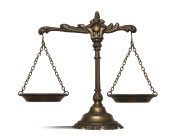
Rav Kraus looked at the young go-getter and said “My dear Reb Sholom business is not your purpose in life. Your purpose is also not being responsible for the growth of Satmar. You need to be in the world of horaah. When you go up to the Next World they won’t ask you why you weren’t an askan why you didn’t build buildings or why you didn’t sell computer programs. They will ask why you weren’t a dayan and why you didn’t light up the world of halachah. That’s what the questions will be. You have a good head. You should be a dayan!”
On Hold
Rav Landau, who is today av beis din of Williamsburg’s Beis Din Ladun Velehoros, was shocked. Although after he married, he had toyed with the idea of eventually pursuing dayanus, it was more of a dream than a plan with substance. “During shanah rishonah I learned in a dayanus kollel, but the need for parnassah quickly pulled me out and into the business world,” he recalls. “Of course I continued a steady learning schedule, was involved in communal work, and all around felt pretty good with where I was holding. I thought I’d found my goal in life. And so I told Rav Kraus, ‘It’s too late now. Even if I wanted to study dayanus today, who would ever view me as a dayan?’ But the Rav insisted: ‘At first it will be hard,’ he said, ‘but in the end everyone will accept you. They will accept your authority. Go study.’ ”
After speaking it over with his family, Rav Landau decided to give it a try. He still maintained a busy business schedule, but he also spent a few hours every day in the beis medrash learning Choshen Mishpat.
“I was slowly drawn in,” he comments, “as if a magnet were pulling me. As the months passed I spent less and less time with the business, pulling out of bids and deals and letting clients know that I was tapering off. After a year I decided to be tested on the entire Choshen Mishpat. By then I knew that this was my life’s path.”
Mazel shined on his learning no less than on his business dealings. Within two years Rav Landau sold his software company, liquidated some real estate holdings, and got rid of another business that he owned, the chain of Duddy’s Bakeries in Brooklyn. The one-time businessman was now spending his mornings in a halachah kollel, his afternoons doing shimush in batei horaah, and learning with chavrusos in the evenings.
“I had tremendous siyata d’Shmaya,” says Rav Sholom. “There were two dayanim that gave me a lot of encouragement, Rav Leibush Teitelbaum z”l in Williamsburg, and Rav Avrohom Hirsh Wosner, the rav of the Satmar kehillah in Monsey. Rav Teitelbaum learned Choshen Mishpat and Yoreh De’ah with me every day, while I did shimush by him and by Rav Wosner.”
But while Rav Teitelbaum and Rav Wosner recognized the young man’s drive and sincerity — and while today Rav Landau’s Beis Din Ladun Velohoros deals with many complicated dinei Torah every month and many more mediations of business disputes, along with basic halachic questions — the two rabbanim were the exception.
“People came into the batei horaah where I was doing shimush. They saw me, the young programmer and real estate developer, sitting alongside the distinguished veteran dayanim, daring to go along the path of dayanus. Actually, even my friends thought it was in bad taste.
“The cynicism I faced during that time was much more than I expected. The people closest to me didn’t get it. ‘Are you nuts?’ they said, really lamming into me. ‘Why are you leaving your business? What makes you think you can be a dayan?’ Some people asked me if I was undergoing a midlife crisis.”
Rav Landau found strength from the promise that Rav Avrohom Hirsh Wosner gave him: If he would leave the business world then Rav Wosner would give him semichah when he finished his course of study.
Rav Teitelbaum also stood firm against all the attacks. “He called me one night and told me, ‘I received a call from one of the menahalim of the beis horaaah. He warned me to stop having you sit in with me or I won’t be asked to pasken there. Now I realize just how important it is that we continue. I want you to come in an extra hour every day.’ ”
At the time, Rav Landau didn’t understand where all that negativity was coming from. Today, however, he says he does. “People are willing to accept someone who’s been in Torah from the beginning, but not someone who was part of the chevrah and one day decides to aspire to something more. It’s hard to fargin someone who makes a change midlife.”
Yet as a successful businessman with people smarts and well-honed intuition, he knew the jealousy wouldn’t last forever. “Anyone who was financially strapped and then found success can tell you how he was initially met with envy that sometimes even led to the breaking off of relationships. You know how it is — when someone suddenly strikes it big, the first reaction of others is that he should lose it. But when the fellow is finally declared ‘officially rich,’ suddenly everyone is okay with him. In this world, once you make it, everyone respects you.”
You Can Too
Ten years later, Rav Landau’s Kollel Ladun Velehoros and its affiliated beis din have become household names in chassidic Williamsburg. A fair share of the kollel members are former businessmen: high-tech entrepreneurs, programmers, or real estate developers — following the same path that the Rosh Kollel trod before them. Indeed, Rav Landau opened this learning track especially with these people in mind. “I looked back on the distress I was in,” he says, “and understood that I had to do something to help others struggling with the same dichotomy while their souls were thirsting to get back to Torah learning.”
The businessmen-turned-yungeleit learn alongside men who’ve never left the yeshivah world. “The joint learning of avreichim from these two groups benefits everybody. The businessmen gain from the bnei Torah and their Torahdig way of thinking, while the veteran avreichim gain a lot of practical insights into the workings of the real world that are very relevant to learning Choshen Mishpat.”
An evening not long ago made the entire endeavor worthwhile. Sixty yungeleit, both alumni and current members of the kollel, received semichah and their “Yoreh Yoreh kedas shel Torah” certificates. The simchah was celebrated in style, graced by the gedolei chassidus of New York, with a special guest from the Eidah Hachareidis of Jerusalem — Dayan Rav Yaakov Mendel Yurovitz.
Then Rav Landau, the ecstatic rosh kollel, finally got up to speak. “I want to tell you an awesome maaseh,” he began, “brought down in Bava Metzia 84. Reish Lakish, before he became an Amora, was the head of a vicious criminal gang that traveled around the world as it was then known. He and his henchmen spread fear wherever they went. He had sunk to the lowest level, until the day Rav Yochanan met him and asked him, ‘When will you start learning Torah?’ The crime boss stood in thought for a moment, accepted the criticism — and went to learn Torah. Let us imagine what happened next. Maybe he thought having the title ‘Rabbi’ would give him more kavod among his friends. Whatever the case, he had no idea what he was in for. He went back to his hideout, took out a suitcase, and started packing. The others asked him, ‘Where are you going? We have a heist scheduled.’ ‘I’m on my way to Rav Yochanan’s yeshivah,’ he told them. ‘I made up with him that I will study to become an Amora.’ They looked at him and he looked at them. Finally, someone broke the silence. ‘What did you say? To learn Torah!?’ The boss answered, ‘Why are you so surprised? I’m not allowed to do teshuvah? I’m going to become an ehrlicher yid, a kosher Jew. I will be an Amora. I can, I only need to want!’
“At this point, his colleagues started to laugh,” Rav Landau continued. “Reish Lakish just smiled. True, his friends weren’t giving him their support or blessings, nevertheless he thought to himself, ‘but I’m going to yeshivah. There it will be good. I’ll make new friends, they will welcome me warmly.’
“This is when something distressing happened. Reish Lakish walked into the beis medrash and everyone moved away from him. ‘The mafia guy just walked in,’ they whispered. ‘He’s here to rob us!’ One person found the courage to walk up to him and ask, ‘What are you doing here? The people sitting here don’t have a cent to their names. We are avreichim, we sit and learn all day. Go look for prey somewhere else.’ Then Rav Yochanan stepped in. He turned to Reish Lakish and said, ‘Try to understand them. They don’t know that you came to learn Torah. They think you came here as a criminal. Sit down and start to learn and everyone will calm down.’ But the talmidim approached Rav Yochanan and asked for an explanation. What does he have to do with the notorious crime boss?
“Rav Yochanan didn’t lose his cool. ‘Don’t be angry,’ he told them. ‘Even Rabi Akiva, the greatest of the gedolim, was an am haaretz until the age of 40. But the talmidim didn’t accept the comparison. ‘Rabi Akiva wasn’t a criminal, he was a shepherd,’ they retorted. ‘How can you bring this gangster into the beis medrash?!’
“Now, morai verabosai, began a very difficult period in Reish Lakish’s life,” Rav Landau told the members of his kollel. “Wherever he went, whatever he did, he was met with scorn and ridicule. Whether in the beis medrash or with his old friends, people thought he must have had a breakdown. But in three places — Shabbos 83, Berachos 63, and Gittin 57 — the Gemara brings the following quote from Reish Lakish: ‘Divrei Torah can only endure in someone who sacrifices himself for them, as it says in the Torah: zos haTorah adam ki yamus ba’ohel. Pashut, to die for Torah. To be alone in the world, no one understands me, no one supports me — but I do what I know is right, literally willing to give my life for the holy Torah.’”
Anything’s Possible
While Rav Landau identifies strongly with the struggles of outlaw-turned-Amora Reish Lakish, he, in fact, was born into an important and well-respected Satmar family. Rav Landau is a seventh generation einekel of Rav Yechiel Michel of Zlotshov zy”a, a talmid of the Baal Shem Tov who composed many niggunim. The Landau family has done much to preserve the Maggid of Zlotshov’s legacy through the foundation Machon Zecher L’Avraham of the Mercaz Mosdos Zlotshov Yampoli, which publishes the Maggid’s seforim and publicizes scholarly articles regarding his derech in Torah and chassidus. The crown jewel of the family project, run by Rav Sholom’s brother Rav Moshe Landau, is a yeshivah by the Maggid’s kever in Yampoli, Ukraine.
The patriarch of the Landau family, Rav Yosef Dov Landau, is a maggid shiur in a yeshivah opened by a third brother, Rav Menachem Dovid, in Kiryas Yoel. Another brother is the noted philanthropist Reb Yoel Landau, one of the biggest supporters of Satmar institutions in Williamsburg.
When Rav Landau initially decided to go into business after the birth of his first child, he first went to his rebbe, the Beirach Moshe of Satmar, who gave him a brachah for success. The business was, indeed, a great success.
“After I got married, I would do shopping in the local grocery store,” Rav Landau explains. “Back then the stores’ cash registers used a complicated program that actually made the line go slower, and all kinds of ideas started going through my mind. I had taught myself about algorithms and programming, and in my spare time worked on models of a program for running businesses. I developed a point-of-sale program, a multifunctional platform that allows administering a small business from top to bottom — orders, stock, invoices, bills — everything. It even calculates which customers can be given credit and which not, based on their buying history. It follows the shopping patterns of each customer, so the manager of, say, a fish store, can know which kind of fish to have in stock for his clientele before Yom Tov. The program became extremely popular among heimishe store owners.”
He ran his business from Lee Avenue in Williamsburg. The company grew, selling software and computer systems, and he eventually sold it for a tidy sum. With the sudden windfall from the exit, the young entrepreneur turned to other outlets for his ambition, primarily real estate. He found himself checking out properties in Brooklyn, acting as an agent, and buying and selling himself.
But life wasn’t only about making money, and community-conscious Sholom Landau jumped into askanus as well. This was during a period of reorganization in both branches of Satmar and as someone with a proven track record in business, he was recruited to help get the mosdos on track.
One of Rav Landau’s projects was the building of a Satmar beis medrash in Williamsburg for the followers of Rebbe Aharon Teitelbaum in time for the first Rosh Hashanah after the petirah of the Beirach Moshe.
“In Satmar the minhag is that on Rosh Hashanah and Simchas Torah the Rebbe davens with the chassidim in Williamsburg, not in Kiryas Yoel,” explains Rav Landau. “Over the course of the summer, we located a large empty plot that we rented. The plan was to erect a huge hangar as a temporary location for the tefillos, until we would be able to find a permanent center in Williamsburg. I ordered the temporary structure, but three weeks before Rosh Hashanah, the company informed us they weren’t able to honor their commitment; the hangar wouldn’t arrive on time. I decided there was no choice but to build a real building on the lot. It wasn’t easy getting people to go along with the new plan. Raise a building in two weeks?! They thought I had lost it! But we raised the funds needed to get the project rolling, acquiring the necessary permits and hiring contractors.
To the amazement of just about everyone, on Erev Rosh Hashanah not only was the building standing and ready for mispallelim, but there was also an ornate aron kodesh, an ezras nashim, flooring, and plumbing facilities. Looking back on the frenetic activity of that long-ago Elul, Rav Landau says the effort was well worth it. “It was a really hard time. People were broken. I felt that I needed to help them.”
He adds that he learned another important lesson that he’s taken with him throughout his life. “It’s not easy to go against the prevailing public opinion, to stand up to thousands of people, all filled with uncertainty, each pulling in a different direction. Of course, everything was done with the close supervision and approval of the Rebbe. But those weeks formed my life. I learned that nothing stands in the face of ratzon. If you truly want it, it really is possible.”
Three Reasons
While Rav Landau admits that having income from his former business career makes some things easier, he insists, “I’m not trying to have an easy life. There is no pleasure in life that compares to the spiritual pleasure of learning Torah, and the serenity of someone who lives in the world of Torah experiences.”
More important than the money, he says, is the real world experience he gained from his years as a businessman, which has helped him as a dayan. “When financial disputes come before me for arbitration or for a din Torah, I understand the issues involved from my own experiences. When you know the halachic aspect as well as the business side, you can get people together more easily and help them to reach a compromise.”
Yet even though he successfully made the transition from businessman to dayan and he founded a kollel to help others reenter the world of Torah and horaah, he notes that it doesn’t have to be for everyone.
“The Rebbe Reb Elimelech of Lizhensk writes in parshas Bereishis that there are five kinds of tzaddikim. Only one of the types is someone who should be a baal horaah, even if he isn’t one in practice.
“For me,” he continues, “I feel my purpose in life is to help others by way of my Torah knowledge, not just by sitting wrapped up in learning for myself. How can someone else help others through his yedias haTorah? There are many ways — horaah, dayanus, arbitration, shalom bayis.
“Rav Chaim Vital writes that there are three reasons a person is created. If a person feels particularly pulled towards doing aveiros, it is a sign he was sent to this world to fight the yetzer hara. If he feels pulled towards a particular mitzvah, it is likely his purpose to repair that mitzvah. And if he does not fit either of those molds, then he was probably sent to this world to help people. Saying shiurim is not the only thing, rather using the Torah knowledge you amassed to help others — that is the purpose.” —
“People are willing to accept someone who’s been in Torah from the beginning, but don’t always fargin someone who’s made a change midlife.” The night 60 men received semichah made the entire endeavor worthwhile. (Inset) Rav Landau’s inspiration, the Beirach Moshe ztz”l
Businessmen-turned yungeleit learn alongside men who’ve never left yeshivah. “I had to do something to help others struggling to get back to Torah”
(Originally featured in Mishpacha, Issue 630)
Oops! We could not locate your form.

